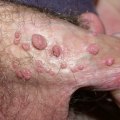Genital warts are soft bumps that can be found on the skin and mucous membranes of the genitals. They can appear on the penis, vulva, urethra, vagina, cervix, and around and inside the anus. These warts are caused by a virus called human papillomavirus (HPV) and are spread through sexual contact. In women, genital warts can be located in and around the vagina or anus, or on the cervix.
They can vary in size from very small to large clusters and can be reddish or white in color. It is possible to have genital warts without any symptoms. In men, genital warts can grow on the tip or shaft of the penis and sometimes on the scrotum, in the urethra (the tube through which urine leaves the body), or around the anus. A doctor will examine you or take a biopsy (a sample of the wart) to determine if you have genital warts. On rare occasions, genital warts can multiply in large groups in people with a weakened immune system. The HPV vaccine offered to girls and boys in the United Kingdom to protect against cervical cancer also protects against genital warts.
However, using a condom every time you have sex is still a good idea since it does not cover all of your genital skin.
Preventing Genital Warts
Limiting the number of sexual partners and getting vaccinated are two ways to help prevent you from getting genital warts. If you think you may have genital warts, you should schedule an appointment with your GP or contact local sexual health services. Using a condom every time you have vaginal, anal, or oral sex is also important to avoid spreading genital warts to your partner. Genital warts can also develop in the mouth or throat of a person who has had oral sexual contact with an infected person. A vaccine is available to prevent types of HPV infections that pose a high risk of genital warts and cervical cancer.Conclusion
Genital warts are caused by HPV and can be spread through sexual contact.They can appear on different parts of the body in both men and women. Limiting your number of sexual partners and using condoms every time you have sex are two ways to help prevent you from getting genital warts. If you think you may have genital warts, it is important to see your doctor for diagnosis and treatment.










